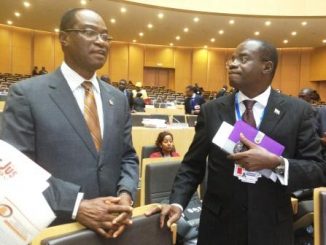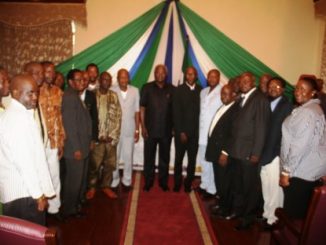
By John Pa Baimba Sesay :
By 2010, during his first term in office as President of Sierra Leone, Hon. Ernest Bai Koroma encouraged the nation, during the Business Bomba Competition Final to” raise production, productivity, and competitiveness in agriculture because it touches the lives of so many Sierra Leoneans.” It was an ambitious dream. So, what the government did in pursuant of this objective was to, among other measures put up key poverty reducing strategies and one was pursuing the Smallholder Commercialization Scheme within the framework of the National Sustainable Agricultural Development Programme and the Comprehensive African Agricultural Development Programme.
IMF commendation: By July of 2011, the International Monetary Fund Country Report No. 11/95 on Sierra Leone highlighted the achievements and progress made in agriculture, thus opining, that “Cocoa exports continued to grow strongly, as they have done for a number of years, reaching US$ 37.1 million in 2010. This likely reflects a combination of growth in production capacity as well as an increase in prices on international markets. A range of other exports that are not recorded separately also increased sharply in 2010 from a total of US$ 20.0 million in 2009 to US$ 78.2 million in 2010. The achievements of a success five years Koroma governance are still being presented to Sierra Leoneans, with strong efforts put together by some of us to avoid what some would refer as false propaganda. What we write and speak presents the realities, as they happen in the country.
Factually, agriculture contributes over 45% of our Gross Domestic Product, employing over two-thirds of the population and generating about a quarter of the export income. Factually, also budgetary allocation to the sector at the time was at a paltry 1.6%; agricultural productivity was very low and farming was basically for subsistence. It is but of great need to disclose the contradictory aspect in this, more so when then President Kabba(h) pinpointed food security as a major force of his government, when on 19th May, 2002 he pledged “…to work even harder to ensure that by 2007 no Sierra Leonean goes to bed hungry.” The Kabba (h) era’s attention to agriculture could best be described as dismal and poor, notwithstanding the false impression given then, that the sector was core in his development agenda as a government.
Koroma’s astuteness: The Ernest Koroma regime was a different one, in not just agriculture, but as was seen in what was achieved in the other sectoral components of our development agenda, like infrastructure, health, youth employment, amongst others. Agriculture was identified as the ‘engine’ for socio-economic growth and development through commercial agriculture and the promotion of the private sector. There were telling effects to this vision; a Presidential Task Force on Agriculture was formulated, under the chairmanship of the President himself. Since then to date, we have continued seeing series of progress and achievements in the sector. This is especially so in line with the desire and strong political commitment on the part of the Minister in charge of agriculture Joseph Sam Sesay (Dr.), a good, hardworking but interestingly, very unassuming gentleman. By 2010; there was an increase in the budgetary allocation to the sector from a paltry 1.6% in 2007 to close to 10% in 2010. We also witness the Prioritization of the Smallholder Commercialization Programme (SCP).This was the investment plan to kick-start the National Sustainable Agricultural Development Programme (NSADP) between 2010 and 2014.Within this period, we also saw achievements like an improved planting materials, secured machinery, equipment and required agricultural enhancing peripherals, including ; a) 210 power tillers; b) 201 rice threshers; c) 266 rice cutters; d) 200 rice mills; e) 161 cassava-grating machines; and f) agro-chemicals including over 30,700 bags of fertilizers and over 4,000 litres of weed killers on a cost-recovery basis. There was also the construction of about 150 Agricultural Business Centres (ABCs) to house the agro-processing facilities referred to above. In fact by June, 2009 the Global Agriculture and Food Security Fund approved our government’s request for US$50m in support of the Smallholder Commercialization Programme. With a realistic desire on the part of government, through the Ministry of Agriculture to improve farmers’ access to financial services, there has been the erection of additional Financial Services Associations (Village Banks) across the country. We have, as a country often spoke of the accomplishments in our country’s infrastructure, especially the road network. One should underscore the point, that the ministry of agriculture has also been playing an integral road in linking farmers to the markets, by supporting the rehabilitation of over 1,000 Km of feeder roads country-wide.
Agriculture for Prosperity: Chapter three of President Ernest Koroma’s Agenda for Prosperity deals with the need to bolster the country’s economy. Knowing the importance of agriculture in this Agenda, 3.5 of the of the President’s development blueprint attaches much significance on scaling up agricultural productivity. It highlighted a number of core challenges facing the sectors and the strategies to be utilized in overcoming these challenges. It talks about the need to continue to provide investment incentives to the sector’s private sector. Achieving such a great plan demands the right leadership. This type of leadership, we have seen in five years in the ministry and we look forward to another outstanding political leadership to be provided by Dr Joseph Sam Sesay and his team of experts in the ministry.
President Koroma, in five years got the right set of people to work with. The general national leadership that was provided by the President should also be commended and this, be spoken on mountain and roof tops that Koroma actually worked and his win, was something he deserved. It is with this right leadership, provided with the development plans, as contained in the ‘Agenda for Prosperity’, coupled with the supporting hands that government Ministers have been providing that we will continue to see agriculture as being very crucial to the prosperity agenda. We can use agriculture for our national prosperity.








Leave a Reply